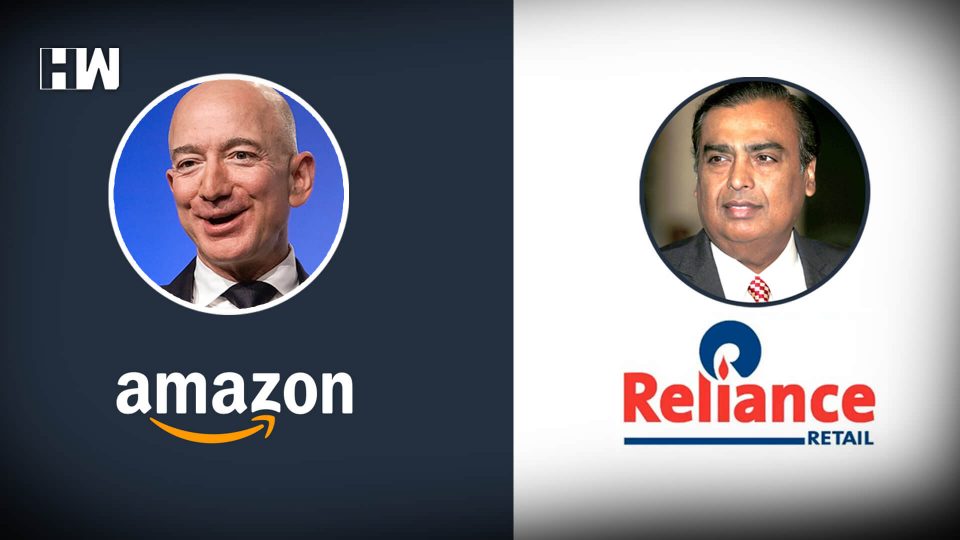The world’s richest man is proposing to acquire stake in a company owned by Asia’s richest man. Reports are rife since a few days that Jeff Bezos owned e-commerce giant Amazon Inc. is looking to purchase a 26% stake in Mukesh Amabni’s brick and mortar giant Reliance Retail.
Why would an e-commerce company be interested in another retail entity that has a physical presence?
Reliance Retail is an unlisted subsidiary of Reliance Industries Limited (RIL), and is the country’s largest brick and mortar retailer which operates 10,644 outlets in more than 6,700 cities and smaller towns, covering a total area of 23 million square feet of shopping space. It sells everything from electronics to groceries to fashion & lifestyle products and even houses its telecom arm Jio’s connections and recharges. Reliance Retail owns 11 different brands including Reliance Fresh, Reliance Digital, Reliance Trends, Jio etc.

Access to India’s offline infrastructure, which includes supply chain and a vast number of stores, is what Amazon is vying for. Amazon has announced its intention to grow its presence in India and has committed more than $ 5 billion in investment. However, without having an offline presence, it would be difficult to do so.

However, the two most important reasons why it’s beneficial for Amazon to team up with Reliance is – India has modified its rules relating to Foreign Direct Investment (FDI) in e-commerce, which became applicable from February onwards. This created additional hurdles for foreign companies such as Amazon and Flipkart and skewed the competition in favour of home grown brands such as Reliance. Other than FDI, new regulations implemented by the government for e-commerce firms that prevent them from offering big discounts and impose restrictions on their investments, also harm them. Therefore, having India’s wealthiest and most influential man in your corner to help lobby the Indian government against such regulations, seems to be a good strategy. What’s that old saying; “If you can’t beat them, join them”.
The second reason is that Mukesh Ambani has already declared his intention combine his digital and retail platforms. This means he plans on integrating his telecom network Jio and Reliance Retail in an effort to benefit from economies of scale. Just a few days ago, Jio overtook Vodafone-Idea to become the largest telecom operator in the country with over 330 million subscribers. Amazon could gain access to this massive user base, particularly in rural India, which would help it gain considerably more visibility in the Indian market.

But what’s in it for Reliance?
This partnership would provide Reliance Retail with ready access to an established e-commerce platform. Besides, it would get access to Amazon’s technology and its global knowledge and experience. However, what seems to be Reliance’s true intention is reduction of debt.
RIL has managed to rack up a massive ₹ 2.88 trillion bill of debt on its balance sheet. A shift in strategy, where RIL aims to divest its interests in the petrochemicals business (which provides it with a lower profit margin), and concentrate on the retail and telecom business, has dented a big hole in its balance sheet, as it borrowed left right and centre to fund its expansion.

Left with no other option, RIL has been selling assets and trying to monetize stake in its companies. In July, it sold 49% stake in its telecom tower and fibre assets to Brookefield Asset Management for ₹ 25,000 crores. It also sold its interests in the East West oil transportation pipeline for ₹ 13,000 crores to the same company just a few months back.

To Reliance’s dismay, two big potential deals, one with Saudi Aramco and the other with Alibaba, have failed to produce results; and both are believed to have failed due to differences in valuation.
While a spokesperson for Amazon declined to comment on this deal, a Reliance spokesperson gave nothing away when we he said that “the company evaluates various opportunities on an ongoing basis and would make necessary disclosures in compliance with the requirements of SEBI rules”.
As an independent media platform, we do not take advertisements from governments and corporate houses. It is you, our readers, who have supported us on our journey to do honest and unbiased journalism. Please contribute, so that we can continue to do the same in future.

